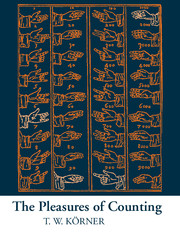Book contents
- Frontmatter
- Contents
- Preface
- I The uses of abstraction
- II Meditations on measurement
- III The pleasures of computation
- IV Enigma variations
- V The pleasures of thought
- 17 Time and chance
- 18 Two mathematics lessons
- 19 Last thoughts
- Appendix 1 Further reading
- Appendix 2 Some notations
- Appendix 3 Sources
- Bibliography
- Index
- Acknowledgements
19 - Last thoughts
Published online by Cambridge University Press: 05 May 2014
- Frontmatter
- Contents
- Preface
- I The uses of abstraction
- II Meditations on measurement
- III The pleasures of computation
- IV Enigma variations
- V The pleasures of thought
- 17 Time and chance
- 18 Two mathematics lessons
- 19 Last thoughts
- Appendix 1 Further reading
- Appendix 2 Some notations
- Appendix 3 Sources
- Bibliography
- Index
- Acknowledgements
Summary
A mathematical career
[When I first started research, I and my fellow students were much in awe of Dusa MacDuff, a research student a couple of years older than us. We knew that she had just made an important breakthrough in a major problem left open by von Neumann concerning the existence of II1 factors. (Here and in the passage that follows the reader will need to accept technical terms on trust.) To us, as I expect to most of my readers, this seemed the most splendid thing possible, and the climax of a mathematical career. As we shall see below, to someone who wanted to do mathematics at the very highest level, it could only represent a beginning.
The speech that follows was given by Dusa MacDuff on the occasion of her acceptance of the first Satter prize. Since this prize was created to ‘recognise an outstanding contribution to mathematical research by a woman in the previous five years’ she, quite properly, dwells on the problems of women in what is still a mainly male profession. However, many of the problems she considers — the difficulty of changing mathematical fields, mathematical isolation and failures of inspiration — are common to both sexes. Some readers may be surprised by the way professional and personal considerations are mingled, but at the highest level of endeavour (and often at lower levels), mathematical and private life must overlap and sometimes conflict. Mathematics is not a nine-to-five job.]
- Type
- Chapter
- Information
- The Pleasures of Counting , pp. 488 - 493Publisher: Cambridge University PressPrint publication year: 1996



